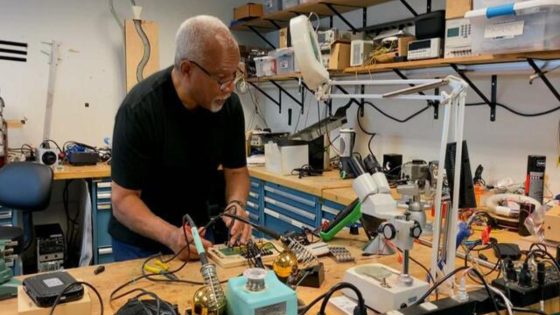Four Freedom awards are given each year to individuals and organisations committed to promoting the four freedoms – speech, worship, want and fear – proclaimed by then-president Franklin D. Roosevelt in 1941. Forrest received the award for freedom from fear.
“It is mind-blowing to be included in this incredible line up of recipients, whose work I have admired and studied,” she said. “It is a privilege to represent a team of women who have built Walk Free to what it is today.”
Forrest says while globally there has been a shift towards renewable energy to meet sustainability targets, the use of state-imposed forced labour prevents a just transition to protect both planet and people.
Workers install solar panels at a photovoltaic power station in Hami in north-western China’s Xinjiang.Credit: AP/File
Almost 90 per cent of the global supply for polysilicon, a common raw material in electronic devices and solar panels, comes from China, with Walk Free noting that about half of that came from Xinjiang, the north-western province that is home to the Uyghurs.
The Chinese Communist Party denies the use of forced labour in its factories in the region, and state-controlled media claims that participation is voluntary. However, state-imposed forced labour in China has received heightened attention in recent years, with calls for all companies to restrict sourcing from the Uyghur region as it has become impossible to operate in accordance with the United Nations Guiding Principles on Business and Human Rights.

A display of models of solar panels in Hefei, China.Credit: Bloomberg
“From polysilicon solar panels, to the treatment of Congolese people, for the mass production of batteries, those supply chains are heading straight into old historical lines,” Forrest says. “And we have an opportunity, and we’re demanding our leaders, you know, are you going to do something differently? Or are you going to cement the same historical power structures into a new economy? It really is a turning point.”
Loading
Forrest has led a push for leading economies worldwide to update their modern slavery laws and was instrumental in a groundbreaking European Union directive recently that will force big businesses to eradicate modern slavery from their supply chains and drastically curb environmental abuse.
She said Australia was also a major importer of products that may have used modern slavery and while electronics and garments were prone to the greatest levels of risk, Forrest said solar panels were a growing area of concern.
Loading
“We need strong laws to drive better business practices and protect the most vulnerable,” she says. This is particularly important against the backdrop of increased vulnerability arising from conflict, economic crises and climate change.”
Forrest recently joined former British prime minister Theresa May’s Global Commission on Modern Slavery and Human Trafficking, to work towards putting modern slavery on the global political agenda, especially urging action from G20 countries.
Forrest says she does not want to dampen people’s enthusiasm for a green future, acknowledging the climate change was “a real risk” to Australians and developing countries throughout the so-called Global South.
“All we’re asking people to understand is that the climate crisis is also a humanitarian one and as we rapidly procure these products, we need governments to ensure there is genuine safety and protection of people at the front of supply chains,” she says.
This year’s other laureates are Save Ukraine/Mykola Kuleba (International Four Freedoms), Bellingcat /Eliot Higgins (Freedom of Speech), Uyghur advocate Zumretay Arkin (Freedom of Worship) and Brazilian Indigenus leader Sonia Guajajara (Freedom from Want).
Get a note directly from our foreign correspondents on what’s making headlines around the world. Sign up for the weekly What in the World newsletter here.
Source Agencies

